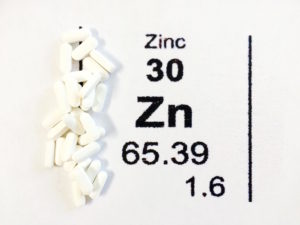
Are you getting enough zinc for healthy fertility? Zinc is a key mineral for both male and female fertility. Yet, a zinc deficiency can be easy to overlook, even by a fertility specialist. Zinc deficiency is common, affecting 12% or more of the American population and as many as 2 billion people worldwide. Correcting a zinc deficiency is easy and could make a big difference in your fertility program. Read on to learn more about the signs of zinc deficiency, and the importance of zinc for fertility.
Zinc Deficiency – Signs and Symptoms
Note: Vegetarians and people over 60 are more at risk for zinc deficiency. High stress, intense training regimens, pregnancy and breastfeeding also deplete zinc stores. Ask a doctor to check your levels if you’re unsure, but be aware that blood tests don’t check for cellular zinc (where most zinc is stored).
- Acne, eczema, and dermatitis- Lack of zinc can cause you to be more prone to skin problems.
- Smell and taste loss- Do your favorite foods taste different or bland? If so, you may need more zinc.
- Low libido- Low zinc can affect libido in both sexes.
- Digestive issues like leaky gut syndrome or diarrhea- Lack of zinc can impair healthy digestion and elimination. In turn, having a digestive issue decreases your body’s zinc absorption.
- Frequent infections- Low zinc weakens a healthy immune response, increasing frequency of colds, flu and other infections.
- Hair loss and white spots on the nails- Low zinc can cause hair loss and white spots on the nails.
- Degenerative disease (atherosclerosis, arthritis)- A zinc deficiency increases inflammation and free radical activity involved in the onset of degenerative diseases.
- Poor hearing and slow wound healing- Lack of zinc affects hearing and slows the healing of wounds.
- Stunted growth- Zinc deficiency often causes stunted growth in children.
Zinc & The Fertility Connection
Zinc is a fertility nutrient for both sexes. Zinc is critical to the synthesis of DNA and RNA, as well as healthy egg and sperm production. While not a direct cause of infertility, a deficiency in zinc can lead to chromosomal abnormalities that can, in turn, lead to fertility problems or increased miscarriage risk.
Zinc and Male Fertility
For men, zinc is key to normal testosterone production and sperm formation. It’s highly concentrated in seminal fluid, and is important for sperm morphology and motility. Zinc particularly supports the outer layer of sperm and the tail. Zinc may even enhance fertility for men who have been smokers by helping to offset the harmful effects of metals like cadmium in cigarettes.
Supplementation with zinc has been found to increase testosterone, sperm count and motility. One study published in Fertility and Sterility finds men who take folic acid and zinc together experience a stunning 74% increase in total sperm count!
Zinc and Female Fertility
For women, zinc supports hormonal balance and a healthy menstrual cycle. It encourages regular ovulation and nourishes the ovarian follicles. Zinc encourages proper protein metabolism for egg health, and enriches follicular fluid for implantation support. Note: The ovulatory cycle of an egg is around 90 days, so it takes at least 90 days of zinc supplementation to experience improvements with your egg health.
In addition, zinc supports blood sugar balance, and the body’s use of estrogen and progesterone. Zinc even blocks excess androgen production, helping to normalize symptoms like acne and hirsutism in women with PCOS. Zinc also works with the minerals selenium and iodine to promote thyroid hormone production- good news for women with hypothyroidism, another fertility blocker and miscarriage factor.
Zinc and Healthy Pregnancy
Zinc is critical for a healthy pregnancy. A lack of zinc can affect the mother’s health, and the baby’s growth, brain development, and immune system. An Indian study finds babies with low birth weights have lower mortality rates when clinically supplemented with zinc. A Journal of the American Medical Association study shows zinc can increase a baby’s head circumference and weight, particularly for pregnant women who are very thin.
Zinc-rich Foods and Supplements
Zinc is very easily consumed in your Fertility Diet. To shore up your dietary zinc, include more of the following foods in your diet:
| raw pumpkin and sesame seeds nutritional yeast wheat germ chickpeas lentils |
quality seafood (shrimp) oysters grass-fed beef organic poultry organic, cage-free eggs |
Zinc is also included in a high-quality prenatal vitamin or a fertility multivitamin like Fertile Woman One Daily. For general dosage, strive for 15-30 mg daily. If you need extra zinc long term, make sure your supplement contains copper, as long-term supplementation can deplete copper levels.
Summary
Improving your zinc status can make a big difference for your fertility health, hormonal balance, and overall health. Most people notice better skin texture, fewer colds and flu, and improved libido right away if their levels have been low. When using zinc from supplements or foods, take comfort in the knowledge that it’s working to support your fertility safely and naturally at a deep body level.
- Page, L. and Abernathy, S. (2011). Healthy Healing 14th Edition.
- Briden, L. (2017, Jan.). 7 Ways Zinc Rescues Hormones. Retrieved from: http://www.larabriden.com/7-ways-zinc-rescues-hormones/
- Brabaw (2016, Aug.). 6 Signs You’re Not Getting Enough Zinc. Retrieved from: http://www.prevention.com/health/6-signs-youre-not-getting-enough-zinc/slide/3
- Rodriguez, H. (2017). Zinc: How Critical Is It To Your Fertility. Retrieved from: http://natural-fertility-info.com/zinc-fertility.html
- Zinc Deficiencies a Global Concern. (2009, Sept). Retrieved from: http://oregonstate.edu/ua/ncs/archives/2009/sep/zinc-deficiencies-global-concern
- Zinc In Your Pregnancy Diet. (2017). Retrieved from: https://www.babycenter.com/0_zinc-in-your-pregnancy-diet_673.bc
- Zinc Supplementation During Pregnancy. (2017). Retrieved from: http://www.who.int/elena/titles/zinc_pregnancy/en/
- Zolton, R.. (2016, June). 6 Ways To Boost Male Fertility Naturally. Retrieved from: http://www.alive.com/family/6-ways-to-boost-male-fertility-naturally/
- Wong WY, Merkus HM, Thomas CM, Menkveld R, Zielhuis GA, Steegers-Theunissen RP. (2002, March). Effects of folic acid and zinc sulfate on male factor subfertility: a double-blind, randomized, placebo-controlled trial. Fertility and Sterility; 77(3):491-8. Retrieved from: https://www.fertstert.org/article/S0015-0282(01)03229-0/fulltext





